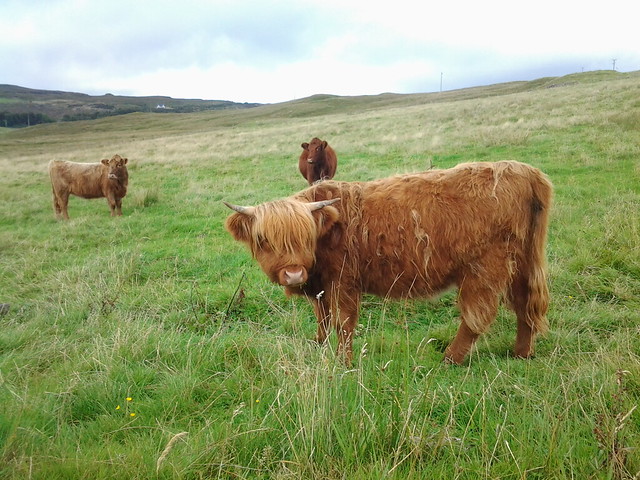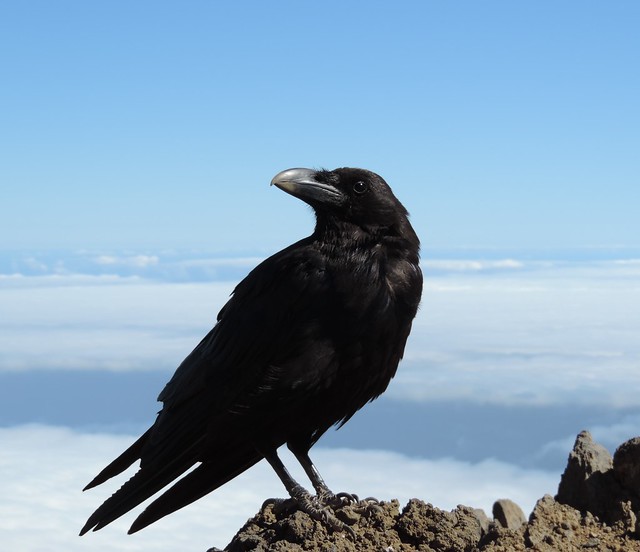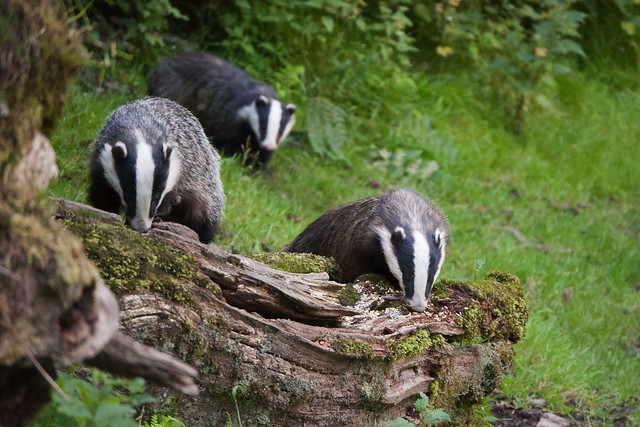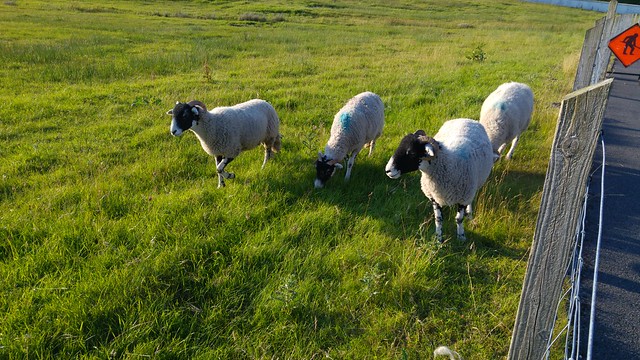Words for cattle, cow, bull, calf and related things in Celtic languages.

Words marked with a * are reconstructions.
| Proto-Celtic |
*bāus = cow
*bow = cow |
| Celtiberian |
boustom = stable (?) |
| Old Irish (Goídelc) |
bó [boː] = ox, cow |
| Middle Irish (Gaoidhealg) |
bó = ox, cow
bóaire = stock-master, stock-owner (“cow-noble”)
bólacht = stock of cattle
bómlacht = cow’s milk
búarach = owner of cows |
| Irish (Gaeilge) |
bó [bˠoː] = cow
bó mhara = sea-cow, manatee
bó shamhraidh = ladybird
bó-aire = cattle lord, cattle owner
bódóir = cow-doctor |
| Scottish Gaelic (Gàidhlig) |
bò [boː] = cow
bò b(h)ainne = dair/milk cow
boineag = small cow
bòthach = pertaining to or abounding in cows |
| Manx (Gaelg) |
booa = cow
booa vluight = dairy cow
boin = very little cow |
| Proto-Brythonic |
*bʉ = cow |
| Middle Welsh (Kymraec) |
buv, bu, buw = cow |
| Welsh (Cymraeg) |
bu = cow, ox, head of cattle (as a standard of value in the Welsh laws)
buach = cowherd, rustic, wretched creature
biw = cow, cattle, horned cattle |
| Middle Cornish (Cernewec) |
biuh = cow |
| Cornish (Kernewek) |
bu = cow |
| Breton (Brezhoneg) |
bu = cow |
Etymology: from the Proto-Indo-European *gʷṓws (cattle). The old Galician word busto (enclosed pasture, a herd of cattle) comes from the same Proto-Celtic roots, via Celtiberian [source].
| Proto-Celtic |
*boukkā = cow |
| Proto-Brythonic |
*bʉx = cow |
| Middle Welsh (Kymraec) |
buvch, buwch = cow |
| Welsh (Cymraeg) |
buwch [bɨu̯χ / bɪu̯χ] = cow
buwch y dwfr = hippopotamus
buwch goch Duw = ladybird
buwchaidd = cow-like, pertaining to cattle, bovine, uncivilized, stolid
buwchan = small cow, young cow, heffer
buwchfrechu = to vaccinate (with cowpox)
buwchfrechiad = (cowpox) vaccination
buwchol = bovine |
| Old Cornish |
buch = cow |
| Middle Cornish (Cernewec) |
beuch, buch, beuh = cow |
| Cornish (Kernewek) |
bugh [biʊx / bɪwh] = cow
bugh godra = dairy cow
bughik = little cow
bughik Dhuw = ladybird
bughvowes = cowgirl
bughwas = cowboy |
| Middle Breton (Brezonec) |
buch = cow |
| Breton (Brezhoneg) |
buocʼh [ˈbɥoːχ / ˈbyːɔχ] = cow
buoc’han = ladybird
buoc’hken = cowhide |
Etymology: from the Proto-Celtic *bāus (cow), the Proto-Indo-European *gʷṓws (cattle) [source].
| Old Irish (Goídelc) |
crod = cattle, herds, livestock |
| Middle Irish (Gaoidhealg) |
crod, crud, (c)crodh = cattle, herds, stock, property, wealth
crodach = wealth, goods |
| Irish (Gaeilge) |
crodh [ˈkɾˠʊh] = cattle, wealth (in cattle), dowry |
| Scottish Gaelic (Gàidhlig) |
crodh [kroː/krɯj] = cattle |
Etymology: possibly from Proto-Indo-European *ḱerdʰ- (file, row, herd) [source]. Words from the same roots include herd in English, Herde (herd, flock) in German and herdhe (nest) in Albanian [source].
| Old Irish (Goídelc) |
ellach [ˈel͈ax] = good, property, livestock |
| Middle Irish (Gaoidhealg) |
ellach = goods, property, stock, cattle |
| Irish (Gaeilge) |
eallach, eallaighe [ˈal̪ˠəx / ˈal̪ˠa(x)] = chattels, goods, cattle, livestock, poultry |
| Scottish Gaelic (Gàidhlig) |
eallach [jal̪ˠəx] = burden, load, goods, property, cattle, livestock |
| Manx (Gaelg) |
ollagh = bovines, cattle, kine |
Etymology: uncertain. Possibly related to sluagh (host, force, army; crowd, multitude, throng) [source].
| Proto-Celtic |
*tarwos = bull |
| Gaulish |
taruos = bull |
| Old Irish (Goídelc) |
tarb [tarv] = bull |
| Middle Irish (Gaoidhealg) |
tarb = bull |
| Irish (Gaeilge) |
tarbh [ˈt̪ˠaɾˠuː / ˈt̪ˠaɾˠu] = bull
tarbhadóir = toreador
tarbhán = bull-calf, young bull
tarbhánta = bull-like, massive, powerful
tarbhántacht = bullishness
tarbhghadhar = bulldog |
| Scottish Gaelic (Gàidhlig) |
tarbh [tarav] = bull, Taurus
tarbh-chù = bulldog
tarbh-nathrach (neimhe) = dragonfly
tarbh-thonn = mighty wave
tarbhach = like a bull, hefty, chunky
tarbhan = small bull
tarbhan-dè = butterfly |
| Manx (Gaelg) |
tarroo = bull, Taurus
taarroo oaldey = bison, buffalo
tarroo-choo = bulldog
tarroo-feeaih = stag |
| Proto-Brythonic |
*tarw = bull |
| Middle Welsh (Kymraec) |
tarỼ, tarv = bull |
| Welsh (Cymraeg) |
tarw [ˈtaru / ˈtaːru] = bull, uncastrated male ox, papal bull, Taurus (sign of the zodiac); valiant leader, fierce hero
tarw dur = bulldozer
tarwgi = bulldog |
| Old Cornish |
tarow = bull |
| Middle Cornish (Cernewec) |
tarow = bull |
| Cornish (Kernewek) |
tarow = bull |
| Old Breton (Brethonoc) |
taruu = bull |
| Middle Breton (Brezonec) |
taru = bull |
| Breton (Brezhoneg) |
tarv [ˈtarw / ˈtɑːro] = bull |
Etymology: from the Proto-Indo-European *táwros (wild bull, aurochs), which possibly comes from, or was borrowed into Proto-Semtic as *ṯawr- (bull, ox), from which we get ثَوْر (ṯawr – bull, steer, ox, Taurus) in Arabic [Source].
The Old Irish Irish word for bull was borrowed into Old Norse as tarfr, which became tarvur (bull, Taurus, womanizer) in Faroese, and tarfur (bull) in Icelandic [Source].
Words from the same PIE root include Taurus and steer in English, taureau (bull, Taurus) in French, toro (bull) in Spanish, and touro (bull) in Portuguese [Source].
| Proto-Celtic |
*laygos / *lāɸigos = calf |
| Old Irish (Goídelc) |
lóeg [l͈oːi̯ɣ] = calf, favourite, darling |
| Middle Irish (Gaoidhealg) |
lóeg = calf, favourite, darling, young deer |
| Irish (Gaeilge) |
lao [l̪ˠeː / l̪ˠiː] = (young) calf
laoidín = tiny calf
laofheoil = veal |
| Scottish Gaelic (Gàidhlig) |
laogh [l̪ˠɯːɣ] = calf, kid (of deer), fawn, term of endearment for a child
laoghach = pertaining to or abounding in calves
laoghan = little calf |
| Manx (Gaelg) |
lheiy [ax] = calf |
| Middle Welsh (Kymraec) |
lo, lloe, llo = calf |
| Welsh (Cymraeg) |
llo [ɬoː] = calf, bullock, simpleton, dolt
llo(e)aidd = calf-like
lloeaf, lloeo, lloea = to calve |
| Old Cornish |
loch = calf |
| Middle Cornish (Cernewec) |
leauh, loch = calf |
| Cornish (Kernewek) |
leugh [løːx / leːx / lɛwh] = calf |
| Middle Breton (Brezonec) |
lue, leuè, leuë = calf |
| Breton (Brezhoneg) |
leue [ˈløː.e / lweː] = calf |
Etymology: a diminutuve of the Proto-Indo-European *leh₂p- (cattle) [source].
| Irish (Gaeilge) |
bearach = heifer, young cow |
| Scottish Gaelic (Gàidhlig) |
biorach [birəx] = a weaned but not fully mature calf or foal (up to 2 years); anti-suckling device, sucking preventer, weaner |
| Welsh (Cymraeg) |
bustach / bustych = bullock, ox, steer (possibly related to the above words) |
Etymology: from the Old Irish berach [ˈbʲerax] (pointed, sharp; having pointed ears, horned), from bir (stake, spit, point; spear, spike) & -ach (related to, having, characterised by, prone to) [source].
| Proto-Brythonic |
*ödjon = ox, bull |
| Middle Welsh (Kymraec) |
eydyon, eidon = ox, steer, bullock |
| Welsh (Cymraeg) |
eidion = domestic male of the bovine family, ox, steer, bullock, neat |
| Old Cornish |
odion = bullock |
| Middle Cornish (Cernewec) |
udzheon, odgan = bullock |
| Cornish (Kernewek) |
ojyon = ox |
| Middle Breton (Brezonec) |
egen, eugen, eugenn = ox, steer, beef |
| Breton (Brezhoneg) |
ejen [ˈeːʒɛn] = ox, steer, beef |
Etymology: unknown [source].
| Proto-Celtic |
*anderā = young woman |
| Gaulish |
anderon = heifer |
| Old Irish (Goídelc) |
ainder [ˈan͈ʲdʲər] = married woman; virgin, maiden |
| Middle Irish (Gaoidhealg) |
ander [ˈæn̠ʲəɾˠ] = girl, maiden, lass; young woman |
| Irish (Gaeilge) |
ainnir [ˈæn̠ʲəɾˠ] = girl, maiden, lass; young woman (poetic); attractive woman |
| Scottish Gaelic (Gàidhlig) |
ainnir [an̠ʲɪrʲ] = maiden, virgin; nymph; marriageable woman; young woman |
| Middle Welsh (Kymraec) |
anneir = heifer |
| Welsh (Cymraeg) |
anner [ˈanɛr] = heifer |
| Old Cornish |
annoer = heifer |
| Cornish (Kernewek) |
annor = heifer |
| Middle Breton (Brezonec) |
annoer, onnoer, ounner, onner = heifer |
| Breton (Brezhoneg) |
annoar [ˈãnwar] = heifer |
Etymology: possibly related to Basque andere (lady, woman) [source].

Sources: Wiktionary, Am Faclair Beag, Online Manx Dictionary, Teanglann.ie, eDIL – Electronic Dictionary of the Irish Language, In Dúil Bélrai English – Old Irish glossary, An Etymological Dictionary of the Gaelic Language, Geiriadur Prifysgol Cymru, Gerlyver Kernewek, Dictionaire Favereau, TermOfis, English – ProtoCeltic WordList (PDF), Etymological Dictionary Of Proto Celtic












